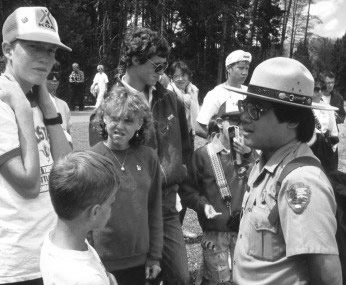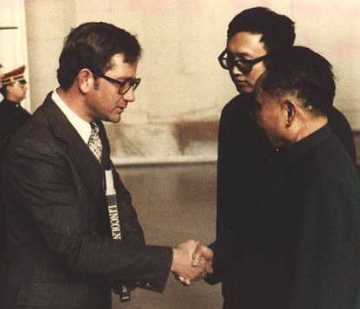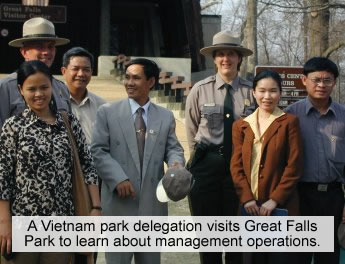



| Introduction | ||
"The 'national park idea,' spawned and nurtured with the creation of Yellowstone National Park in 1872, has contributed to the creation of over 1,200 national parks and equivalent reserves worldwide. They have been referred to as 'Yellowstone's children.' It is not surprising then that many nations turn to the U.S. for advice and assistance on park planning and management and that park staff from around the world come in a regular flow to observe park operations in the U.S. and discuss problems of mutual interest... it is reportedly impossible for the National Park Service to keep up with the demand for American expertise." - "National Parks in the World Community," Parks and Recreation Magazine, 1973 Since that article was written, the number of parks and protected areas globally has swelled to more than 100,000 sites. The National Park Service is recognized by the international community as a leader for its excellence in protecting and preserving America's heritage. In this leadership role, the Park Service has shared its diverse and varied talents, expertise, and experiences in mutually beneficial international partnerships. These partnerships are created to establish, sustain and strengthen parks, heritage sites, and other types of protected areas, both domestically and internationally. Through international cooperation, the National Park Service also continues to strengthen and improve its capabilities to achieve its domestic mission. |

Hands across the border! The Superintendent of Glacier NP joins in a handclasp with the Superintendent of Waterton Lakes NP, Canada which ajoins the American Park to the North. The scene is at border monument along the international boundary. (1960 Image: National Park Service Historic Photograph Collection.)
|
|
| Our Mission | ||
In its 1997 Strategic Plan, the National Park Service acknowledged its international role with the following mission statement:
|
 An NPS Ranger answers questions from American and international visitors.
|
|
| Our Role | Our Purpose | |
The role of the Office of International Affairs is to serve the National Park Service by engaging more fully the talents and available resources of the Park Service for the implementation of its domestic and global missions. It evaluates opportunities and coordinates responses involving the National Park Service in international programs, projects, and activities. It also provides leadership in the fulfillment of U.S. foreign policy objectives through implementation of treaty obligations and other agreements. The Office of International Affairs, utilizing its broad network of contacts, optimizes the Service’s efficiency, responsiveness, and accountability in collaborating with its international partners. OIA initiates projects and responds to requests for assistance by: utilizing appropriate NPS field and program expertise, navigating requirements of domestic and international laws and customs, and leveraging financing and resources from partners in the national and global communities. |
The Office of International Affairs provides the overall framework for the Service’s international programs and coordinates the fulfillment of the Service’s mandates, obligations, and responsibilities for international activities. It collaborates and coordinates with the Service’s partners for international programs on major global conservation issues. OIA evaluates requests for assistance to maximize the impact and effectiveness of the Service’s limited resources. Finally, OIA enhances the Service’s ability to accomplish its domestic mission through increased experience and professional growth of its employees derived from their participation in international programs. |
|
| Our History | ||
The National Park Service has been involved internationally almost from the very beginning of the Service. The first director of the Park Service, Stephen Mather, frequently received requests from other countries seeking advice in developing their own national park systems. During the 1930s, the National Park Service sent one of its first international delegations to South America, where it reported on the major parks of that continent. After the second world war, the Park Service was asked to help develop and organize the Japanese national park system. In 1962, following the first World Park's Congress, the Office of International Affairs was established. Some of the major activities in the 1960's included:
|
|
|
| The 1970s, 80s & 90s | ||
| Some of the highlights of the 1970s included: |  |
|
|
||
During the 1980s the National Park Service helped develop Asir National Park in Saudi Arabia and provided extensive assistance to the national parks of Thailand, among other countries. |
A State visit by the Chinese Vice Premier (front, right) to the Lincoln Memorial in 1979. National Park Service Director Bill Whalen welcomes him to the memorial and prepares to present a book on Lincoln to the premier. |
|
 |
During the 1990's and over the past decade, the National Park Service expanded its successful Volunteers-in-Parks (VIP) program internationally, with the International Volunteers-in-Parks (IVIP) program. The past 20 years have also seen the establishment of over three dozen sister park relationships as informal frameworks for the no/low cost exchange of lessons learned, new techniques and common concerns and challenges between NPS park units and foreign counterpart parks. Formal agency to agency relationships (via Memorandums of Understanding) have been established by the NPS with over a dozen other national park agencies in this time, allowing for stronger cooperative efforts on issues of common concern such as migratory birds and species, wildfire management, and transboundary ecosystem management. |
|
| The Challenge | ||
The international program of the National Park Service helps us meet our global obligations as well as our domestic legislative requirements. It is increasingly apparent that many NPS sites and the National Park Service are dependent upon cooperation with other nations for effective and beneficial park management and resource conservation. The challenge faced by OIA and the Park Service is how to continue empowering park and conservation authorities and personnel, both domestically and internationally, in enhancing the protection of the world’s natural and cultural resources during times of fiscal constraints. |
The American park idea that was initiated with the development of Yellowstone National Park has been embraced worldwide to secure the protection, management, and interpretation of the world’s significant natural and cultural resources. It is critically important to sustain the concept of "best practices" for park and conservation management internationally. |
|
| Contact Us | ||
The National Park Service Office of International Affairs can be reached in the following ways: |
||
| Mailing Address: U.S. National Park Service Office of International Affairs (0050) 1201 Eye Street, NW, Suite 550A Washington, DC 20240 |
By Phone or Fax Phone: (202) 354-1800 Fax: (202) 371-1446 |
|
For questions about the International Volunteers in Parks program, the primary contact is Linda Bennett at 202-354-1806 or Linda_Bennett@nps.gov or the secondary contact is David Krewson at (202) 354-1807 or David_Krewson@nps.gov. |
||
Stephen Morris, Chief, Office of International Affairs (World Heritage issues) email: Stephen_Morris@nps.gov |
Linda Bennett, International Cooperation Specialist (International Volunteers in the Parks program) email: Linda_Bennett@nps.gov |
|
April Brooks, International Cooperation Specialist (Travel documentation and clearances) email: April_Brooks@nps.gov |
Rudy D'Alessandro, International Cooperation Specialist (Asia, Pacific, Arctic, Europe, Gabon) email: Rudy_DAlessandro@nps.gov |
|
David Krewson, International Cooperation Specialist (Africa, Middle East, International Volunteers in the Parks, Website Development) email: David_Krewson@nps.gov |
Jonathan Putnam, International Cooperation Specialist (Western Hemisphere, International Seminar, Park Flight, World Heritage) email: Jonathan_Putnam@nps.gov |
|
| Return to the top | ||